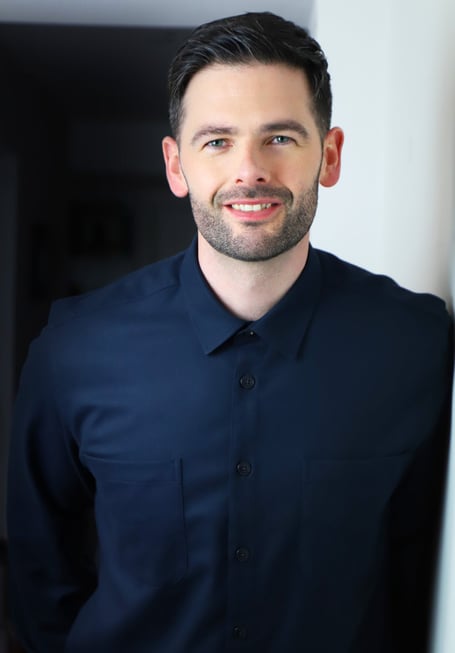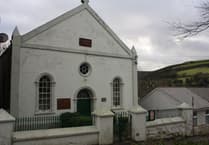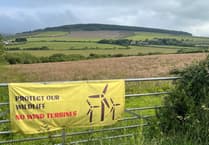He’s done hundreds of reports for the BBC and last month brought the story of FC Isle of Man to audiences around the UK.
But, in an interview with the Manx Independent, the Belfast- based journalist and presenter, and former Isle of Man Newspapers’ sports reporter, Rick Faragher tells us why his year is set to get even busier and why he remains passionate about stories from his homeland.
How long have you been at the BBC?
In October, it’ll be nine years, which is scary because I remember my first day like it was a few weeks ago.
I’d lived in Northern Ireland previously, having done a master’s degree at Ulster University, but to return and walk into one of the most revered and respected newsrooms anywhere was one hell of an experience. I knew straight away I was lucky to be there but I really had to apply myself.
Basically, you’re never more than a few feet away from a journalist who’s at the very top of their game.
The BBC showed a lot of trust in me early on. Within a few weeks, I was reporting live for TV and radio, presenting news bulletins, and being flung into breaking stories. It was the kind of professional education I wanted and, frankly, I’m still learning almost a decade on.
I think that’s a good thing.
In time, I started to take a big interest in how good programmes were made – both TV and radio then, more recently, podcasts. What makes great TV, what works and what doesn’t, how to make compelling radio or podcasts, how to tell stories in a way that hits home with people. It’s similar with presenting, too.
It’s really rewarding to front the stories I’ve sometimes put years of work in to.
But there isn’t a one-size-fits-all approach to presenting and I’ve had to learn to adapt depending on the output. For example, my natural style is pretty relaxed and conversational, which works well for many reports or programmes, but sometimes that’s not appropriate.
Brief outline of your ‘day job’?
It’s never been the easiest job to sum up concisely and it’s changed a bit over the years.
In really simple terms, I’m a journalist who helps to create the BBC news output people listen to in Northern Ireland.
But then, I also create and present documentaries. I sometimes present TV news bulletins and cross over into sports events and coverage.
I’m currently producing a podcast series for BBC Sounds. So, yeah, plenty of variety.
One trend that’s happening right across the media industry is the broadening nature of job roles.
For example, ‘journalist’ has become a much wider term now.
Years ago, some journalists just did TV or radio or, of course, print. Then they did TV and radio. Then they did, TV, radio and online. Now they do all that plus a podcast and special features for digital news and social media…and probably produce all their own stories.
I joined the BBC in my late 20s and there aren’t many journalists the same age or younger who aren’t very multi-platform.
For example, my upcoming BBC Sounds documentary with Carl Cox, I chased the story with his media team, arranged the technical logistics for the interview, prepped for it, recorded it, edited the whole doc, wrote up a digital feature about it, helped to oversee the promotion and various paperwork.
That’s just one project. To be honest, that was one of the simpler projects.
What projects are you
currently working on?
Well, I’ve just mentioned the one that I’ve just finished editing.
It’s called Carl Cox: Music and Motorbikes and is available on BBC Sounds from Monday. It’s basically one of the world’s greatest DJs talking about his lifelong love of two wheels, road racing and move into motorsport team management.
And yes, he’s obviously mad about the TT and mentions it a lot in this documentary.
What’s great is that Carl talks about both his love of bikes and career simultaneously, so I was able to mix rave music from the ’80s and ’90s into crackly TT commentary from the ’60s.
Carl’s a fascinating guy who’s invested heavily in two very different worlds. If you’re a fan of the bikes or dance music then you’ll really like it. If you’re a fan of both then you’ll love it.
The reaction to the recent Football Focus feature about FC Isle of Man has stopped me in my tracks, to be honest.
It’s had overwhelmingly positive feedback from everyone I’ve spoken with and from viewers across the UK. You can never be too sure how a feature like this will be received but I’m delighted for the club because FC Isle of Man is an authentic, feel-good, story.
And look at what they’re achieving now. Unreal. It’s a story that’s only just starting, really.
It’s important to me to bring well-told, insightful, stories about the Isle of Man to audiences in our neighbouring islands. The Isle of Man, its community and the Manx identity, historically, haven’t been well documented in network media but there are so many great stories to be told. I did a special TV feature for BBC Breakfast in 2019 about Joseph Pilates and Knockaloe internment during the First World War, which I think really struck a chord with people and also got great feedback from people everywhere.
I’ve always got my eye on the next compelling Manx story that I can take a huge audience, and I don’t think I’ll ever be any different in that respect.
How did you get involved
in the TT coverage?
Well, I was humbled to be asked just after Christmas. For a Manx guy working in broadcast media, of course the TT is as big as it gets.
It’s an exciting new format and the team behind the scenes, in front of the camera and behind the mic are phenomenally talented.
I can’t wait to get started, to be honest. It’s one of the most anticipated TTs ever and I think there’ll be a really special vibe around the island this year. It feels like we’ve been talking about this event for so long and now we’re just a few weeks away.
It’s of course a huge challenge for me and everyone involved but one I know everyone is raring to get stuck in to. There will be people watching who’ll be new to the event and people will be viewing live coverage from all over world. It’ll be landmark fortnight for the event.
Have you got any other
projects in the pipeline?
Yeah, after the TT I return to Belfast and we start filming a BBC documentary I’m presenting about a supercar race that took place on the outskirts of the city in the 1920s and 30s. It was known as the Ards TT, which was the old circuit used for the RAC Tourist Trophy.
Basically, for nine years the world’s fastest and most expensive cars tore round these roads in front of hundreds of thousands of spectators.
The drivers were everyone from local daredevils, to Italian superstars and even Siamese royalty. It was, of course, very dangerous and ultimately ended in one of the sport’s most tragic days.
The event isn’t particularly well known about. I was only made aware in 2015 when I covered the auction of a 1935 Aston Martin ‘Ulster’ – a line of vehicles designed to compete in the race.
It sold for £3million and I was determined to create a programme about the event, exploring this largelyforgotten sporting spectacle.
I didn’t think it would take seven years to happen but it’ll be worth the wait.
Alongside that, I’m currently producing the BBC Bikes Podcast which will be available on BBC Sounds from next month. It’s a big project running throughout the summer where we meet some famous names from the world of motorbikes. We’ve recorded a couple of episodes so far and I’m really excited about how it’s coming together.
There are a couple of other projects I’ve got my eye on so we’ll see how the rest of the year pans out but this summer, for sure, will be flat-out.


.png?width=209&height=140&crop=209:145,smart&quality=75)


Comments
This article has no comments yet. Be the first to leave a comment.